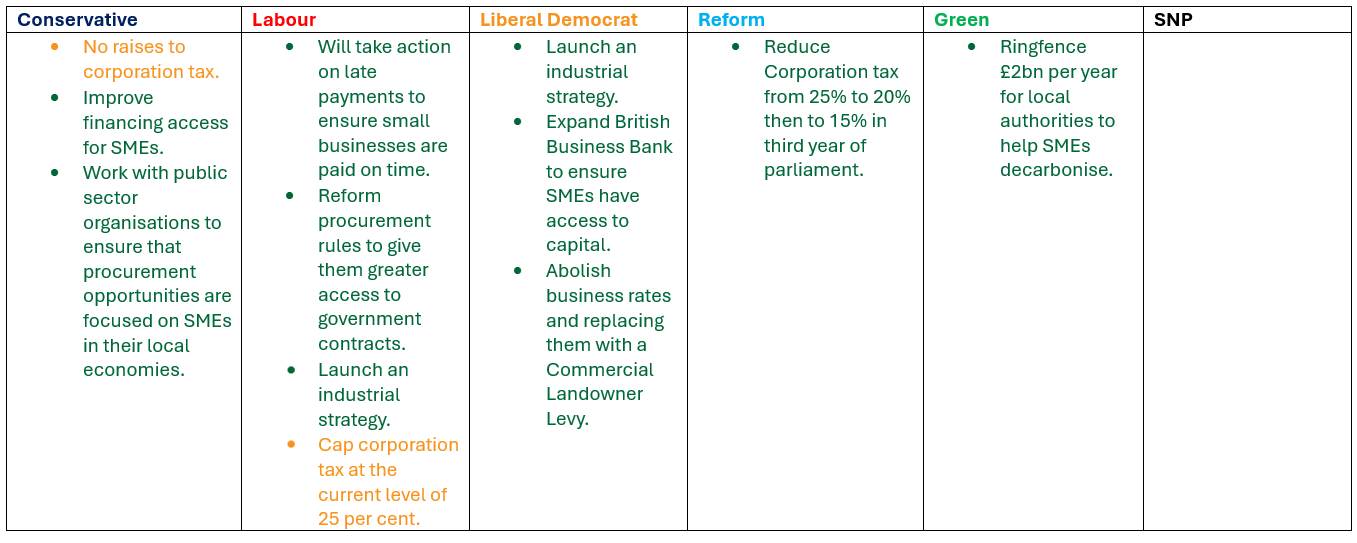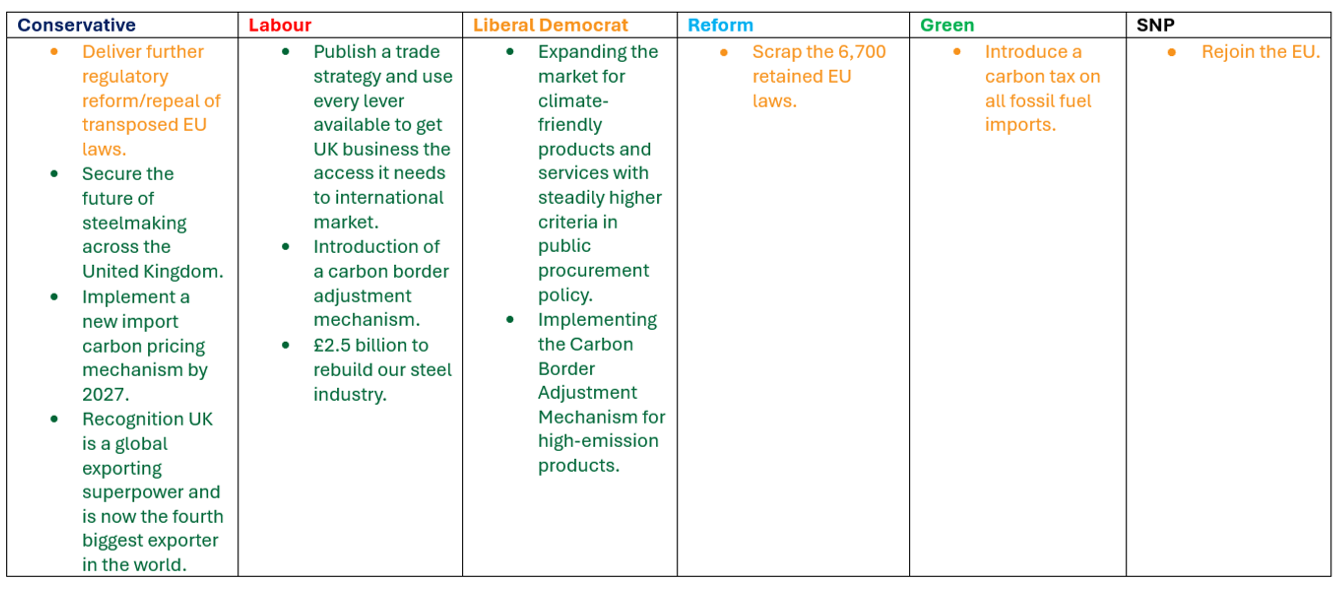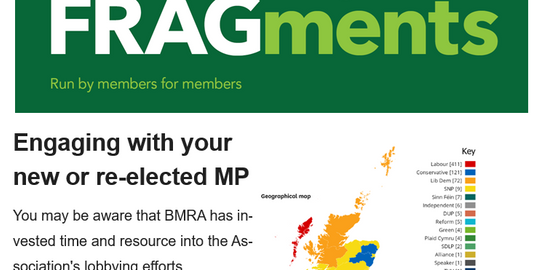General election - Thursday 4 July
Welcome to the third in our series of articles looking at the UK parties’ manifestos and their impact on metal recyclers.
Let’s start with Corporation Tax. Competitive business taxes are a vital tool in a government’s arsenal to encourage economic growth. Even still, it was expected that some political parties would strongly consider increasing the headline rate of Corporation Tax. BMRA was therefore pleased to see that all six political parties analysed have no current plans to increase it.
However, BMRA members with profits in excess of £250,000 were paying a 19% rate in the financial year before last. As such we have given both the Conservatives' and Labour’s pledges to not raise the tax as neutral. In contrast, Reform UK’s policy to reduce Corporation Tax from 25% to 20% immediately, and then to 15% in third year of parliament receives a positive, green light from BMRA. For businesses with profits less than £250,000, the picture is murky, but our inclination is that those rates will not be altered.
SMEs also benefit from three of the main UK parties’ manifestos. The Conservatives promise to improve financing access, as do the Liberal Democrats. The Conservatives also intend to work with public sector organisations to foster procurement opportunities for SMEs, which Labour pledge to do as well. Labour also plan to take action on late payments to protect SME’s cash flow. With this policy, the devil is not in the detail, but in the enforcement.
The Green Party receive their namesake for their plan to ringfence £2bn per year for local authorities to help SMEs decarbonise. Additional green lights are given to both Labour and Liberal Democrats for their plans to launch an industrial strategy, which could well give metal recyclers a thriving environment for investment. For the industrial strategy, the devil will be in the detail.
Liberal Democrats have noteworthy plans to replace Business Rates with a new Commercial Landowner Levy that would be paid by the owner of the premises instead of the tenant. The levy would also remove buildings and machinery from calculations, which we believe would result in lower taxes for the overwhelming majority of metal recyclers. More research is needed, however, to understand its impact on members who operate on high-value land such as our Londoners.
Moving to trade. BMRA welcomes the Conservatives' recognition that UK is a global exporting superpower, and Labour’s plan to develop a trade strategy and use every lever available to get UK business access it needs to international markets. BMRA intends to leverage these manifesto positions to ensure that neither of these parties propose impediments to the export of scrap steel during the next Parliament.
We are also pleased to see, arguably the two main parties, directly reference support for the steel industry. The Conservatives pledge to ‘secure the future of steelmaking across the United Kingdom’ whilst Labour promise £2.5bn to rebuild our steel industry – both these policies receive a green rating due to their capacity to secure a steady domestic demand for scrap steel.
The Conservatives, Labour and the Liberal Democrats all pledge to introduce a carbon-border adjustment mechanism (CBAM). This policy will place a tax on importers of in scope products, which will include steel and aluminium products, if there is a gap between the carbon price applied in the country of origin (if any) and the carbon price that would have been applied had the good been produced in the UK. If implemented, BMRA believes it may encourage importers to procure secondary steel/aluminium products as any carbon price would be significantly cheaper than products produced with largely virgin materials. As a result, BMRA has given these policies a green rating.
The Green Party plan to raise Government's revenues with introduction of a carbon tax on all fossil fuel imports. Though the morals of taxes on carbon imports are sound, the concern is this will increase metal recyclers’ energy bills and operating costs, when these have already increased substantially as a result of the energy crisis and the removal of the red diesel entitlement. Balancing morality with practicality leads BMRA to give this policy an amber rating. A preferred policy option would be the Liberal Democrats’ green-rated ambition to expand the market for climate friendly products...with steadily higher criteria in public procurement policy. This policy creates demand-side pressure for low-emission products such as scrap-based metals, lowering UK’s overall emissions whilst not risking increased operating costs for metal recyclers.
Whilst Brexit is no longer the most salient issue in the lead up to a UK election, it is still very much on the agenda. Virtually all the parties make reference to continental Europe in some capacity, but the Conservatives, Reform UK, and SNP do so with significant relevance to metal recyclers. The Conservatives promise to deliver further regulatory reform/repeal of transposed EU laws, whilst Reform UK declare they will scrap the ‘6,700’ remaining retained EU laws. The purpose of retaining EU laws in areas such WEEE, producer responsibility and best available techniques was to provide continuity for operators. Revoking these laws therefore, could lead to significant legal changes for operators. Such changes, would give BMRA an opportunity to lobby Government to pursue business-friendly regulation, but this could not be guaranteed.
SNP on the other hand, would rejoin the EU if elected into Government. This would give UK policymakers a seat at the table with one of our biggest trading partners, and providing our policymakers an opportunity to directly influence the plethora of laws affecting UK metal recyclers which are EU-derived. For some BMRA members however, being subject to the revised Waste Shipment Regulations, which makes it more burdensome to export wastes, may be unwanted.
Key:
Green – positively impacts metal recyclers
Amber – impact could positively and/or negatively impact metal recyclers
Red – negatively impacts metal recyclers
Policy RAG-rating:Business

Policy RAG-rating: Trade




